A levels 2023: Results by subject

A-level results were released across England on Thursday, revealing an expected fall in the proportion of top grades awarded to students as grading returned to 2019 levels.
Exams returned last summer following two years of cancellations due to the pandemic, with mitigations in place and more generous grade boundaries to assist students who had experienced disruption to learning.
This year, the government and Ofqual have overseen a return to pre-pandemic grading, with “some protection against any impact of Covid disruption”.
Here are the headline figures for today’s A-level results broken down by subject.
English and maths
There was an expected fall in the proportion of top A* grades in English literature and maths compared with last year.
Just 10 per cent of entries received the highest grades this summer, compared with 16.5 per cent last year, for English literature, while 16.5 per cent of maths entries were awarded an A* this year compared with 22.8 per cent in 2022.
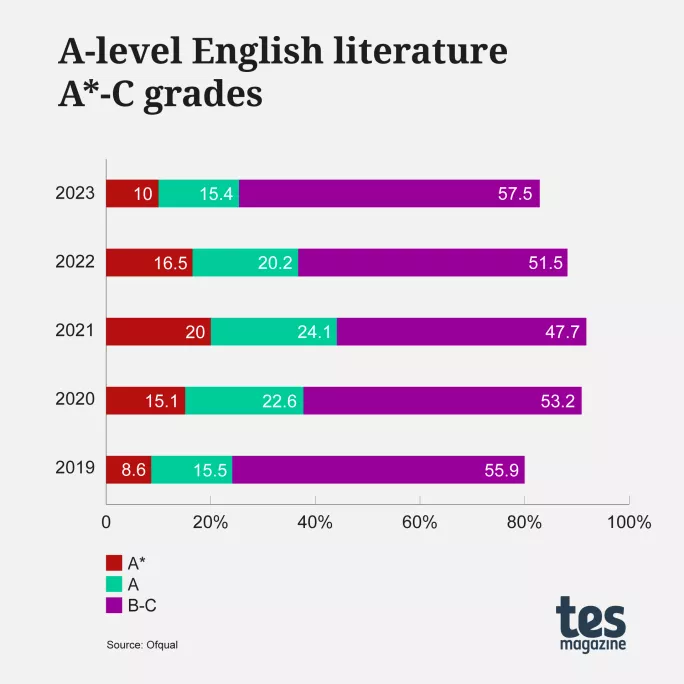
However, as was intended with a lowering of grade boundaries this year, the attainment rate for both subjects was much closer to 2019 levels, when 8.6 per cent of entries received the top grade in English literature and 16.3 per cent in maths in the same year.
The proportion of entries achieving a top grade in English literature fell by 11.3 percentage points this year from 36.7 per cent in 2022 to 25.4 per cent in 2023.
The number of students who sat an English literature exam rose after a dip last year by 1,197 to 33,682.
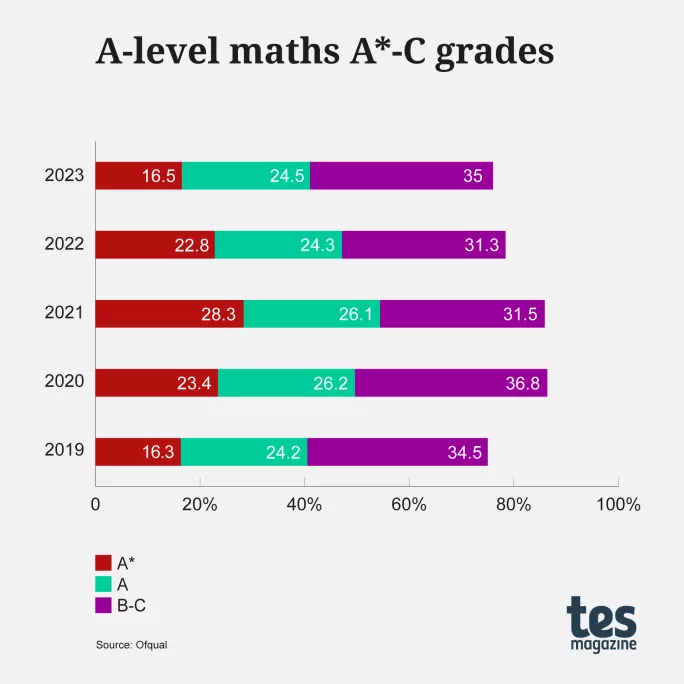
The number of students sitting maths also rose to 89,855 compared with 88,316 last year.
And 16.5 per cent were A*s, compared with 22.8 per cent in 2022 and 16.3 per cent in 2019.
Sciences
All science subjects saw a fall in the proportion of top grades achieved this year compared with 2022, but levels were slightly above 2019, in line with other subjects as grading boundaries were lowered to pre-pandemic levels.
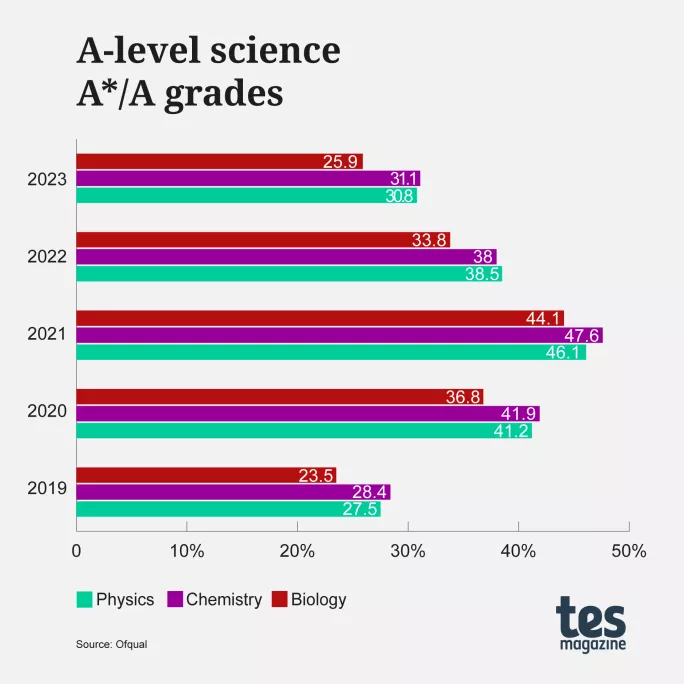
In biology, 25.9 per cent of entries gained an A or A*, compared with 33.8 per cent in 2022 and 23.5 per cent in 2019.
And 31.1 per cent gained an A or A* in chemistry, compared with 38 per cent the previous year and 28.4 per cent in 2019.
In physics, 30.8 per cent gained the two top grades compared with 38.5 per cent in 2022 and 27.5 per cent in 2019.
Entries rose across all three science subjects.
Overall science entries were up on 2022, with 160,073 entered for biology, chemistry and physics this year, compared with 155,693 last year.
Meanwhile, the science subject that saw the biggest drop in top grades compared with last year was biology, with the number of entries awarded grades A* or A falling by 7.9 per cent.
Arts
In art and design, 13 per cent received A*s, compared with 18.7 per cent in 2022 and 12.2 per cent in 2019.
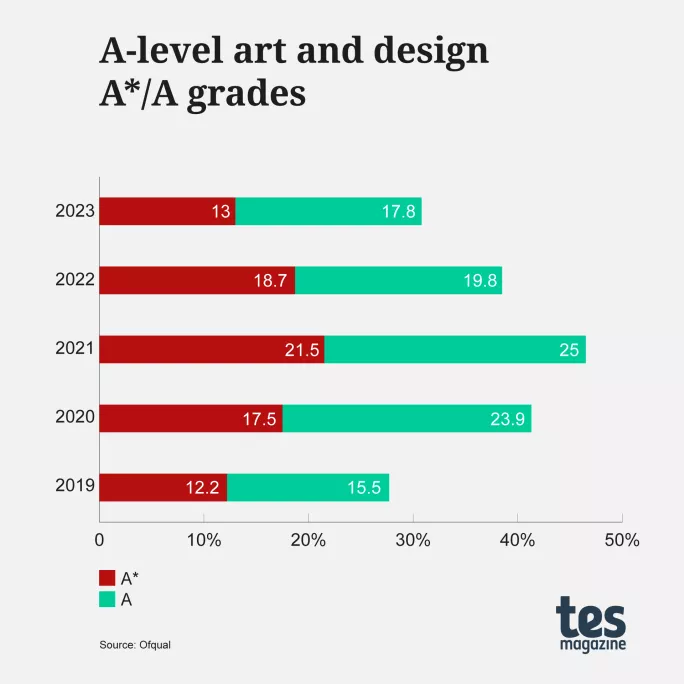
The number of students sitting art and design decreased to 40,594 this year, compared with 41,737 last year.
In drama, 5.4 per cent received an A*, compared with 14.9 per cent in 2022 and 4.3 per cent in 2019.
Drama also saw a large fall in the proportion of top grades awarded: 20.8 per cent were awarded an A* or A grade in 2023, down by 17.5 percentage points from last summer (38.3 per cent), but up from 18 per cent in 2019.
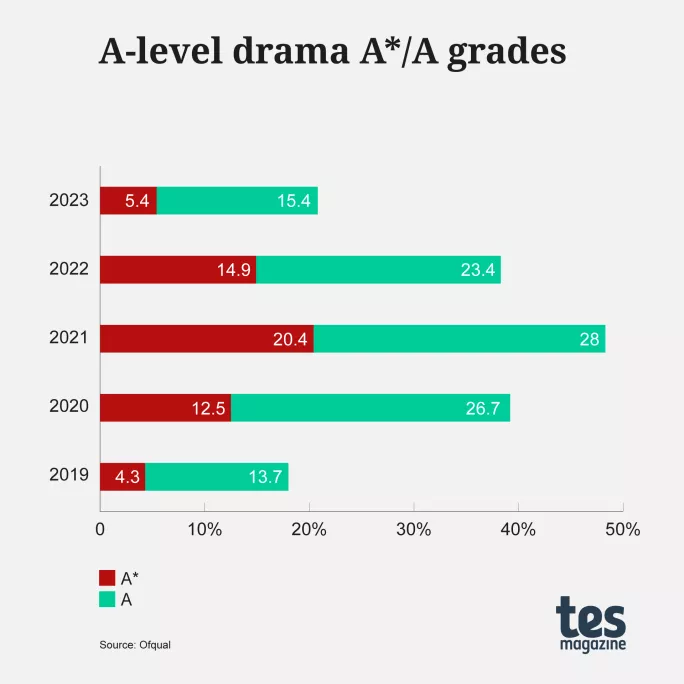
And 8,340 students sat drama this year, down from 8,923 in 2022.
Music saw a huge dip in top grades compared with last year, with a 19 percentage point fall in the proportion achieving A or A* (42.2 per cent in 2022 and 23.2 per cent in 2023).
In 2019, 19.3 per cent of A-level music entries achieved an A* or A grade.
Languages
Spanish saw the largest drop in top grades awarded among A-level results for modern foreign languages (MFL) this year, with a fall of 15.6 percentage points compared with 2022.
The proportion of top A* or A grades awarded in Spanish was just 0.1 percentage points above 2019.
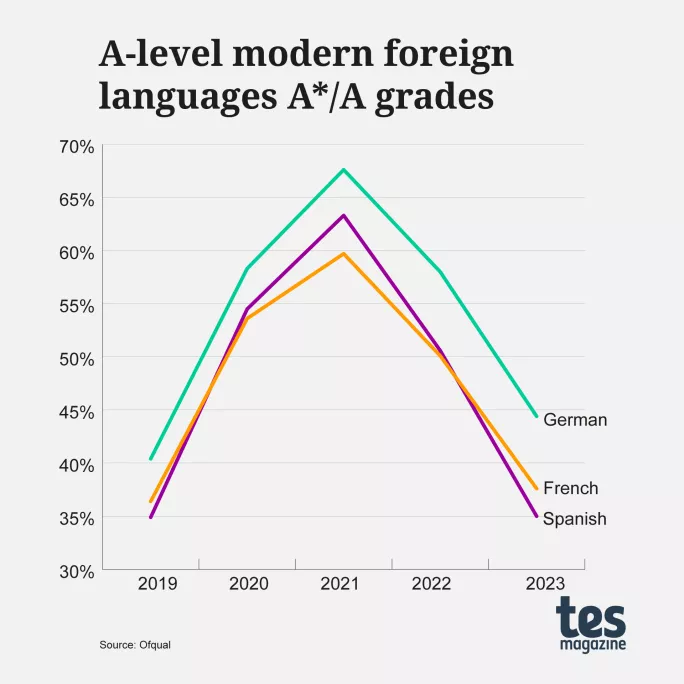
In German, 14.1 per cent achieved the top A* grade, compared with 26.6 per cent in 2022 and 12.1 per cent in 2019.
In French, 10.6 per cent of entries achieved an A*, compared with 20.1 per cent in 2022 and 9.7 per cent in 2019.
In Spanish, 10 per cent of grades awarded were A*, compared with 22.5 in 2022 and 10 per cent in 2019.
Provisional language entries were far below previous years: overall, there were 16,125 entries for French, Spanish and German in 2023, compared with 18,750 entries in 2022.
Spanish was yet again the most popular MFL A level, with 7,464 entries in 2023. There were 6,463 entries for French, and German had 2,198 entries.
Humanities
In geography, 17.9 per cent of entries achieved an A, compared with 22.1 per cent in 2022.
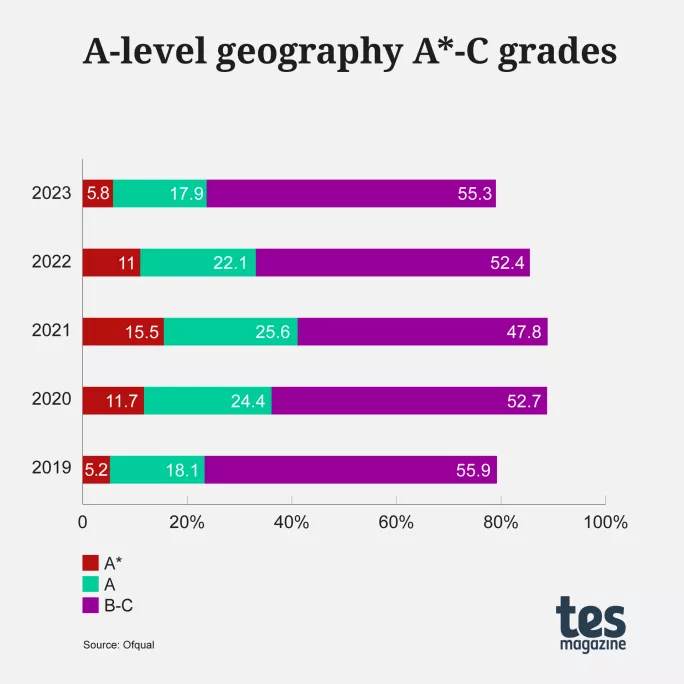
Geography saw a rise in the number of students sitting the subject this year, with 34,700 recorded.
Meanwhile, in history, 5.5 per cent received A* grades, a fall from 12.1 per cent in 2022 but up from 4.9 per cent in 2019.
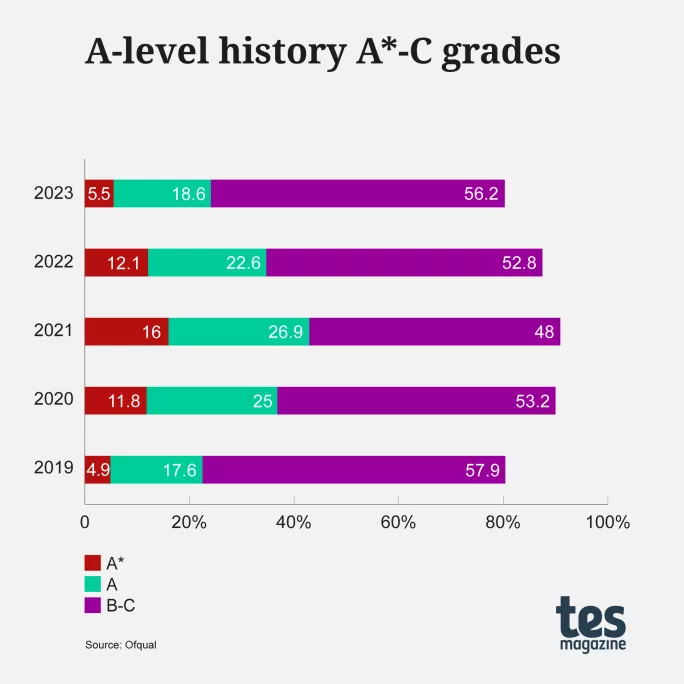
In computing, the proportion of students achieving a top A* or A grade fell by 13.4 percentage points, from 35.1 per cent last year to 21.7 per cent this summer, but up from 17.6 per cent in 2019.
Concerns over subjects with fewer entries
Experts have raised concerns about the declining numbers in certain A-level subjects.
The British Council has highlighted how German had the largest fall in entries against 2022 compared with other subjects, at 15.9 per cent, while French and Spanish saw the third and fourth largest decrease.
Vicky Gough, British Council schools adviser, said: “It is disappointing to see continued decreases in the numbers taking A levels in German, French and Spanish, particularly as they have seen some of the biggest decreases out of all A-level subjects.
“The benefits of having language skills and an understanding of other cultures cannot be overstated, particularly as the UK renegotiates its place on the world stage.”
She said the formation of the National Consortium for Languages Education (NCLE), led by University College London with the British Council and Goethe-Institut, would reinvigorate languages study in English schools.
“Funded by the Department for Education, the consortium will select 25 lead hub schools across England to deliver training to improve language teaching and learning across the country,” she added.
Religious studies A-level exam entries have decreased by 3.5 per cent in England and 24 per cent in Wales this year.
Sarah Lane Cawte, chair of the Religious Education Council of England and Wales (REC), said: “These results show the really concerning impact that teacher retention and recruitment is having on the subject.
“For the last two decades, A-level religious studies has been a success story with growing numbers of entries and impressive results that have opened up a world of opportunity, particularly for people from disadvantaged backgrounds, providing them with access to top universities and careers in law, journalism and teaching.
“That legacy is now threatened. A teacher training bursary and a fair allocation of resources to the subject would help reverse this trend and ensure RE continues to thrive as it has done for the last decades.”
You need a Tes subscription to read this article
Subscribe now to read this article and get other subscriber-only content:
- Unlimited access to all Tes magazine content
- Exclusive subscriber-only stories
- Award-winning email newsletters
Already a subscriber? Log in
You need a subscription to read this article
Subscribe now to read this article and get other subscriber-only content, including:
- Unlimited access to all Tes magazine content
- Exclusive subscriber-only stories
- Award-winning email newsletters
topics in this article



